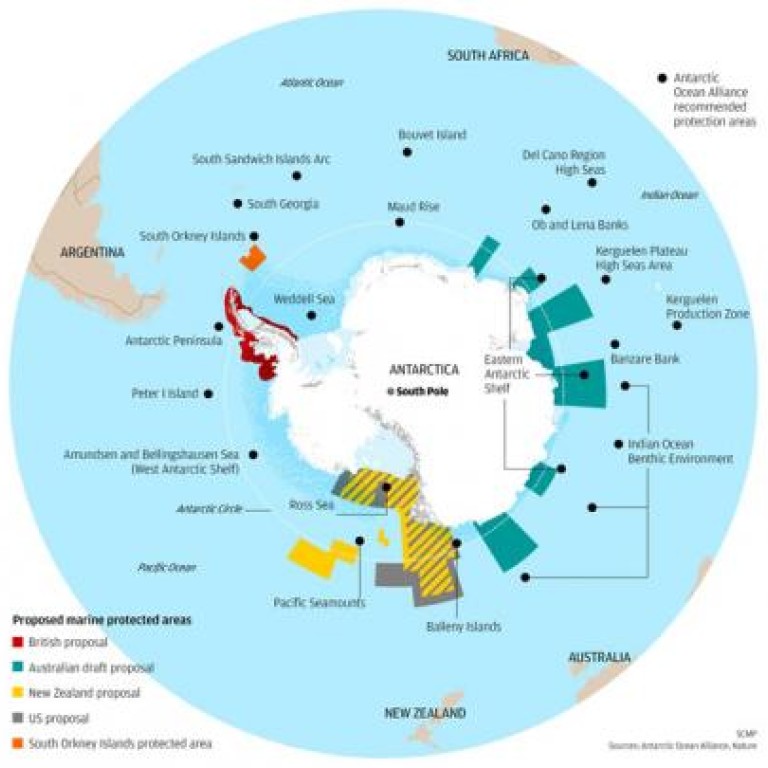
China and Russia help block Antarctic sanctuary plan
Conservation groups are angry over resistance to plan for protected areas in Antarctica, the world's most pristine marine ecosystem
Conservation groups expressed outrage after resistance led by China and Russia stymied efforts to carve out new marine sanctuaries and protect thousands of species across Antarctica.
Hopes were high that a reserve covering 1.6 million square kilometres would be agreed for the pristine Ross Sea, the world's most intact marine ecosystem.
A group of nations led by Australia and the European Union also wanted 1.9 million square kilometres of critical coastal area in the East Antarctic safeguarded.
But two weeks of talks at the Commission for the Conservation of Antarctic Marine Living Resources (CCAMLR), made up of 24 countries and the European Union, at Hobart in Australia ended on Thursday without resolution after China, Russia and Ukraine raised concerns about fishing restrictions, which saw the talks fail, officials said.
The Antarctic conservation commission will now hold an intercessional meeting in Germany next July.
The Antarctic Ocean Alliance, made up of 30 international organisations, including the Pew Environment Group, WWF, and Greenpeace, said it was hugely disappointed.
Alliance official Steve Campbell said: "CCAMLR members failed to establish any large-scale Antarctic marine protection at this meeting because a number of countries actively blocked conservation efforts."
An official at the meeting said she felt it was as much a show of political power by China and Russia as fishing restrictions.
"I think there was a little bit of: 'Don't tell us what we can or can't do', as well as keeping their options open," the official said.
Farah Obaidullah from Greenpeace accused the Antarctic conservation commission of behaving more like a fisheries organisation than one dedicated to conservation of Antarctic waters.
"If there is a glimmer of hope to be pulled from the ruins, it is in the redoubling of the commitment to create marine protected areas expressed by most CCAMLR members," he said.
"The question now is whether countries like Russia, China and the Ukraine will come to the next meeting prepared to meet their conservation commitments."
The Antarctic region is home to big populations of penguins, seals and whales found nowhere else on Earth, and also has unique seafloor features that nurture early links in the food chain, according to environmental groups.
The Antarctic Ocean Alliance said climate change was affecting the abundance of important food sources for penguins, whales, seals and birds, while growing demand for seafood was seeing greater interest in the Southern Ocean.
The Commission for the Conservation of Antarctic Marine Living Resources was established in 1982, with the goal of conserving marine life in the face of rising demands to exploit krill, a shrimp-like creature which is an important source of food for species in the Antarctic.
While the commission permits fishing, it must be carried out "in a sustainable manner and take account of the effects of fishing on the ecosystem".
The push for protection in Hobart was widely supported by A-list personalities, with Leonardo DiCaprio launching a petition ahead of the meeting urging the creation of the largest marine sanctuary in the Antarctic ocean.
It has so far been signed by more than 1 million people, including fellow actors Ed Norton and Mark Ruffalo, entrepreneur Richard Branson and the bands Linkin Park and Maroon 5.
Gerry Leape, senior officer at the Pew Environment Group, called the outcome a "resounding disappointment".
"In 2011, countries agreed to work together to protect and conserve the unique marine life that thrives in the ocean surrounding Antarctica," he said. "Instead, they are heading home and leaving the door wide open to unchecked commercial fishing in these special areas."

